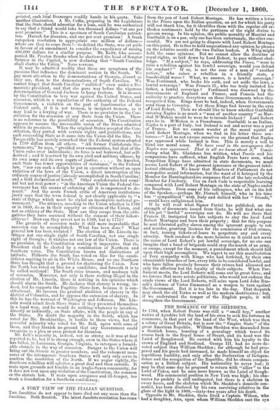A TORY VIEW OF THE ITALIAN QUESTION.
Tin Jacobites do not appear to have died out any more than the Jacobins. Both flourish. The latest Jacobite revelation has come
from the pen of Lord Robert Montagu. He has written a letter to the Times upon the Italian question, an act for which his party will not thank him, for it identifies them with the regular old or- thodox sentiments held by the partisans of the right divine to govern wrong. In his opinion, the public morality of Mazzini and Garibaldi is on a par, only one has been unfortunate, the other suc- cessful. We are not going to dispute with Lord Robert Montagu on this point. He is free to hold unquestioned any opinion he pleases on the relative merits of the two Italian leaders. A Whig might hold the same opinions. But we cannot allow the doctrine of royal rights, as laid down by Lord Robert, to pass without chal- lenge. "If a subject," he says, addressing the Times, "were to raise a rebellion against his lawful sovereign, would you defend his conduct?" If so, is not the case of a man of "another nation," who raises a rebellion in a friendly state, a hundredfold worse ? What, we answer, is a lawful sovereign ? Was Ferdinand, who broke his oath, and set aside the laws, a lawful sovereign ? Was Francis II., who too truly imitated his father, a lawful sovereign ? Ferdinand was disowned by the Governments of England and France, and Francis had the audacity to practice deceptions on those Governments when they recognized him. Kings must be bad, indeed, when Governments send them to Coventry. Yet these Kings find favour in the eyes of Lord Robert. Then we should like to know whether Garibaldi entering Naples is as much a "man of another country" as Mar- shal M‘Mahon would be were he to invade Ireland ? Lord Robert says he is. M‘Mahon is a Frenchman. Garibaldi is an Italian. Naples is a part of Italy, but Ireland is not and never was a part of France. But we cannot wonder at the moral squint of Lord Robert Montagu, when we find in his letter these sen- tences—" Let us not excuse ourselves on the ground that Naples was oppressed while Ireland is free. This is merely a veil to blind our moral sense. We have read in the newspapers that Naples was oppressed. That is all we know about it." Consi- dering what Mr. Gladstone has written, what Poerio and his companions have suffered, what English Peers have seen, what Neapolitan Kings have admitted in state documents, we must accuse Lord Robert of the grossest ignorance or the grossest intel- lectual obtusity. We know that Members of Parliament do not monopolize sound information, but the want of it betrayed by the Member for Huntingdonshire surpasses that of the late redoubted. Member for Finsbury. Cox on Jack Cade is respectable learning compared with Lord Robert Montagu on the state of Naples under the Bourbons. Even some of his colleagues, who sit on the left of the Speaker,—perhaps Mr. Disraeli himself, who in his time has "sympathized" with Italy and dallied with her "friends," —could have enlightened him.
If he will read what Signor Farini has published, on the strength of documents issued. from Gaeta, he will find what one of his pet " lawful " sovereigns can do. He will see there that Francis II. instigated his late subjects to slay the local Lord Robert Ilontagus and burn their property ; that for this purpose he sent liberated galley slaves among the ignorant people to rob and murder, ranting licenses for the commission of foul crimes, in fact, issuing tickets-of-leave to perpetrate any and every atrocity. Such conduct is the more heinous as it could not serve the cause of Lord Robert's pet lawful sovereign, for no one can imagine that a band of brigands could stop the march of an army, or escape, except for the moment, a punishment which should fall upon their high accomplices. We regret to see this manifestation of Tory sympathy with Kings who had forfeited, by their own abominable breaches of law, every title to be considered lawful, and who have fallen precisely because their crimes had alienated not only the affection but the loyalty of their subjects. When Par- liament meets, the Lord Roberts will come out in great force, and we foresee that more astute politicians, who would not endorse the crude views of the Lord Roberts, will seize upon Lord John Rus- sell's defence of Victor Emmanuel as a weapon to turn against the Government. But it is too late in the day. That despatch may shock the old Tories as well as the modern doctrinaires; but, if we understand the temper of the English people, it will strengthen the Government.


























 Previous page
Previous page